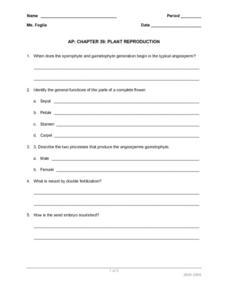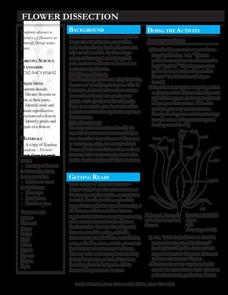Scholastic
Study Jams! Flowers
RJ hangs out in Zoe's garden as she explains pollination, flower anatomy, and fertilization. This cartoon-styled feature is sure to stay in your botanists' minds! Follow it with the dissection of large flowers, such as the lily.
Curated OER
Flower Dissection
In this science activity, students follow directions for dissecting a flower. Students tape the parts of the flower in the corresponding boxes. Students also read about how flowers reproduce and analyze a related diagram.
Curated OER
Reproduction in Flowering Plants
Detailing the structures and functions of flowering plants, this slide show will help your students understand the processes and the conditions that allow pollination and fertilization. Labelled diagrams help introduce the reproductive...
Curated OER
AP: Chapter 38: Plant Reproduction
Short, but sweet, this handout questions the learner on the structures and processes of plant reproduction. Budding botanists draw a dicot seed, label a flower diagram, and describe the functions of different flower parts. It also covers...
Curated OER
Flower Reproduction
Fifth graders examine the cycle of flower reproduction. They listen to a poem about a bee, observe and examine flowers in small groups, and develop a class KWL chart. Students then read about flower reproduction in their textbook, and...
Curated OER
Fantastic Flower
Here is a clever activity on pollination of flowers for you. In it, learners study the anatomy of a flower, and play a game in which they simulate the process of pollination. This fine plan brings in elements of art, physical education,...
Curated OER
Pollination of Flowers by Moths
Turn your classroom into a pollination station as your kids transform into moths or predators trying to survive and aiding in plant reproduction along the way. Using silent party blowers as proboscises, the moths will have two minutes to...
Curated OER
Plant Life Cycles
Follow the life cycle of a dandelion with a lab sheet for kindergartners. They learn about the order of events in a dandelion's life, then put the stages of life in order. Can they describe the life cycle of a pumpkin? For extra...
American Museum of Natural History
What's This? Reproduction
Attracting the right mate is as important for humans as any other species. An interesting lesson teaches individuals about several strategies that animals and plants have adapted to attract their mates. From colorful nests to powerful...
Garden Earth Naturalist Club
Parts of a Flower! Flower Dissection
Sometimes the best way to learn about plants is to see the different parts of a plant yourself. Groups of learners dissect flowers to answer questions about what they observe and what they wonder about their flower.
Curated OER
Flower Structure and Reproduction
In this plant science worksheet, students color and label the different parts of the flower. They write short answers to 14 questions about flowers.
Curated OER
How Do Flowering Plants Reproduce
Students investigate how flowering plants reproduce. They identify and describe the functions of the major sexual organs of a flower and fruit by examining and dissecting flowers and fruit.
Curated OER
Introduction to Plant Reproduction
Eight objectives pertaining to plant reproduction are stated and addressed in this presentation. Objectives include defining sexual and asexual reproduction, comparing monocots to dicots, explaining flower types, and more. Some of the...
Curated OER
Flowers and Their Life Cycles
First-time florists will be able to label the structures of simple and composite flowers after reading this handout and answering the comprehension questions. There are a couple of grammatical errors in the text, but the content is...
Curated OER
Asexual Reproduction
Presented clearly and accurately, this PowerPoint introduces biology learners to asexual reproduction in plants. It begins by comparing asexual to sexual reproduction by definition and by the pros and cons of each. The remaining slides...
Curated OER
Flower Dissection
Beginning biologists pull a flower apart and familiarize themselves with the different reproductive structures. Why have them learn only from just a book or diagram when they can examine real samples? There is no link to the referenced...
Curated OER
Bee Pollen Popular
The world would be a much different place without the help of pollinators. Read about the important role bats, hummingbirds, and various insects play in plant reproduction, exploring the interdependence of living things in an ecosystem....
Curated OER
Introduction to Plants
A vast overview of avascular and vascular plants, this PowerPoint displays all of the notes your botanists need to take. It lists primitive plant groups and their characteristics. It separates gymnosperms and angiosperms, also detailing...
Curated OER
Review of Plants
In this plant science worksheet, students complete 45 multiple choice questions on plant reproduction and different plants of a plant.
Curated OER
Plant Reproduction Chapter #4
The only way to employ a plant reproduction presentation void of pictures is to support it with actual sample flowers. Botany beginners learn about plant reproduction through an underdeveloped outline of flower structures, reproductive...
Curated OER
Flower Power
Students explore the parts of flowers and how they reproduce. They dissect flowers and observe the reproductive organs. Students observe anthers and ovaries of Tiger Lilies under a microscope. They investigate how insects and other...
Curated OER
Ecology - Reproduction and heredity
Young scholars correlate signs of spring with reproductive strategies of varioius organisms. They describe how organisms inherit traits from generation to generation.
Curated OER
Fun with Plants Flower Power
Students understand the parts of the flower. In this flower lesson, students perform experiments to see where seeds come from. Students complete a data sheet about the experiment. Students understand the terms pistil and stamen.
Curated OER
Flower Power
Young scholars explore parts of the flower. In this plant biology lesson, students dissect flowers and identify how the seeds are formed. Young scholars take a nature walk to pick flowers for future dissections.

























